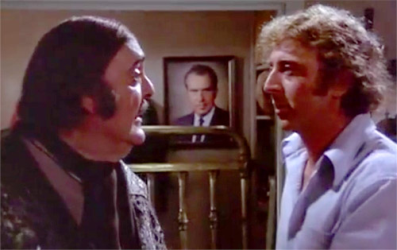Imagine, if you will, Night of the Living Dead but with rhinoceroses. That would be a pretty good summary of Eugene Ionesco’s play Rhinoceros, if you added in that the play is meant, at some level, to be a comedy. It was a movie I had always wanted to see, despite not knowing of its existence until a week ago. (I did know of the play, though.)

I stole this from a site called “Not Coming To A Theater Near You.”
The premise is simple enough: A dispirited young accountant (Gene Wilder), bored to tears with life and drinking himself to death, is witness to a rhinoceros rampaging down the street of his small American town. (In the play, I believe it was a French town but even that may have just been a localization from Ionesco’s original Romanian concept.) He does not find much interest in the incident, and in his neglect is upbraided by his dear friend, a rather uptight conservative fellow (Zero Mostel) with a love of culture and contempt for the manners of the everyday people around him.
When he goes to work the next day, his co-workers and boss are all discussing the issue, with one left-wing fellow talking about how the papers always lie, and raving of conspiracies and treason, and the others—while accepting the incident—treating it as a rather banal event. The hallmark of the story is how banal everything is to people, and the ordinary phrasing and clichés they use to discuss even the most extraordinary events.

Nixon…approves?…of rhinoceritis?
Things get knocked in to twelfth gear when the wife of a missing co-worker comes in breathless from having been chased down the street by a rhino. She came to deliver a key from her husband, who had gone out of town for the weekend and knew her boss would need it. “So conscientious!” sighs the boss, even as she relates that there’s a rhino in the lobby of the building. Later on, she recognizes a rhino attacking outside the window as her husband.
“How do you know it’s him?”
“Those are his glasses! Don’t you recognize him?”
“Yes…and no…”

“Yes…and no…”
The first act is really quite a masterpiece of physical comedy and absurdity. The second is almost tragically absurd, as Wilder tries to help Mostel, who has been stricken with rhinoceritis. In the final act, Wilder and his office crush (a remarkably cute Karen Black) form a pact of love, though we already suspect that Black is doomed. While Wilder is struggling with the question of how to fight The Herd, Black insists that you have to let other people do what they want with their lives (even as they smash up the city and trample people). In the span of a few minutes they go from honeymooners to old married couple, and before you know it: rhinoceros! Wilder is left as the last man on earth, though even he seems as though he would give it up if only he could.
The Boy said, “The reason this works is because whatever it’s a metaphor for, it’s also about a guy dealing with the everyday problem of rhinoceroses!” And he’s right. I take it as a metaphor for communism—Ionesco himself talked of left and right-wing, but his right wing were things like Nazis—and the perils of group think and mob mentality (hello, Global Warming! Social Justice Wariors! Public School Systems!), but the story stays very concrete in the actual problem of herds of rhinoceroses. This enhances the absurdity on the one hand while grounding it, however weirdly, in the set up reality. It follows its own rules, we would say.

The arc of a love affair…
It’s very ’70s. The music was a bit hit-and-miss, I thought. The Flower said “That was something different!” and I double-checked to see whether it was good or bad. Good, but not at all what she was expecting. The Boy and His Girl gave it a thumbs up. I liked it, too, quite a bit. It’s not for everyone: There is a great deal of shouting, though it is about as good as shout-comedy can be, done by people who did it the best, and what’s being shouted is pretty damn funny to boot. Also, you have to be able to accept the premise, but in a lot of ways, it’s a lot easier premise to accept than the actual history that inspired it.
It is remarkably applicable today, which is probably why it keeps popping up in various forms and re-enactments. (Though it was a popular play and won Mostel a Tony, too.) Allegedly, Zombie Strippers is based on this movie. The movie was not well received at the time, for all the reasons that we like it today, I suspect: From what is essentially an artsy play, director Tom O’Horgan makes a rather accessible comedy that isn’t bogged down by the sorts of politics that would get this movie a warm reception (and would be banal at best today, and incomprehensible at worst).

The poster in the back reads “Do not ever compromise yourself—that’s all you have.”
